Research highlights at the WIAI faculty
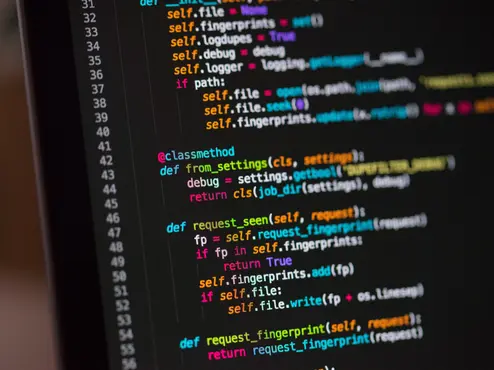
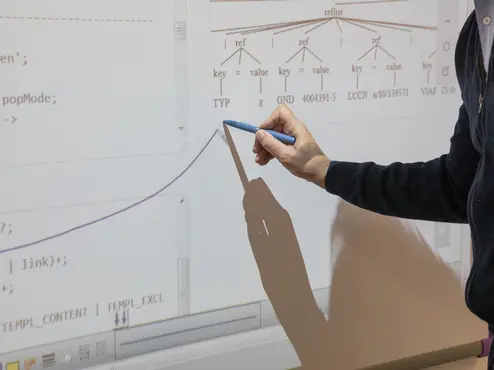
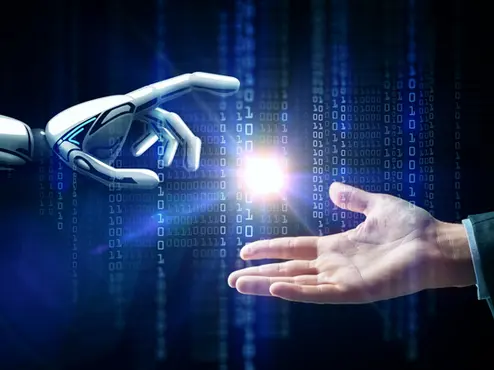
In addition to numerous research projects at the chairs and professorships, there are a wide range of collaborative research projects both within the faculty and in interdisciplinary cooperation with other subjects.
Pioneers in the field of Digital and Computational Humanities
The Chair of Computing in the Cultural Sciences was already filled in 2002. Since then, the field of digital humanities has been growing continuously in teaching and research. The focus is on projects for the material and non-material security of cultural assets in interdisciplinary cooperation with monument preservation and other areas of cultural studies.
Current projects:
DARIAH is a research initiative within the framework of the European Strategy Forum for Research Infrastructures (ESFRI) and is funded in Germany as a national sub-project "DARIAH-DE" by the Federal Ministry of Education and Research (BMBF). For the national joint project, essential objectives were defined in line with the mission of DARIAH-EU: In addition to the expanded application of digital methods in the cultural and human sciences, the focus of the initiative is in particular on building a sustainable federation infrastructure for interdisciplinary access to research data.
Scientific institution:
Center for Innovative Applications of Computer Science (ZIAI)
The Center promotes interdisciplinary research in the field of applied computer science and its transfer in cooperation with subjects from the university's main research areas. It deals with the research, development and testing of innovative information technologies for humanities, cultural, social, and human sciences disciplines.
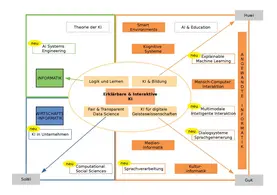
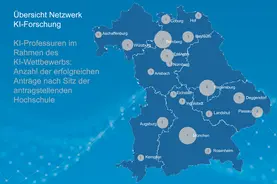
Human-centered Artificial Intelligence - AI in partnership for Digital Humanities, Education and Health
“University of Bamberg as a new AI Center in Bavaria"
Artificial intelligence and machine learning have been a central aspect of teaching and research at the faculty since 2004. The focus is on the development of comprehensible and transparent intelligent technologies that aim to support people with AI and not replace people with AI: interactive companions instead of autonomous systems. With method-oriented basic research in the central AI areas of "Inductive Logic Programming" for explainable machine learning (white-box learning) and knowledge representation as a basis for the machine realization of cognitive processes, research at WIAI enjoys a great international reputation.
As areas of application for AI and ML systems, the focus in Bamberg is on socially relevant areas such as education and health as well as applications in the humanities and cultural sciences.
Thematically, Bamberg cooperates closely with the Center for Artificial Intelligence in Data Science Würzburg CAIDAS.
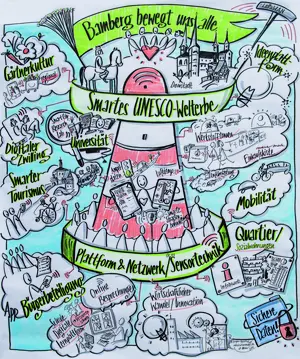
The WIAI faculty is essentially involved in the interdisciplinary „Smart City Research Lab“, which supports the City of Bamberg scientifically on its way as a Smart City model city in topics such as digital world heritage, data-supported mobility management, digital citizen or health services. Partner universities of the TechnologieAllianzOberfranken (TAO) and students are also involved in the projects via the TAOLinkLab. Within the framework of the Living Lab Bamberg, various technological activities and installations are coordinated that explore and test mobile and sensor-based IoT applications. In this context, chairs and professorships of the University of Bamberg, the Coburg University of Applied Sciences and Arts as well as Bamberg IT companies cooperate in various research and teaching projects, such as the joint project "FutureIOT - Intelligently Networked Solutions for Cities and Agriculture", which was funded by the Bavarian Research Foundation from 2018-2021.
Contact:
- Prof. Dr. Daniela Nicklas/Prof. Dr. Marc Redepenning, University of Bamberg. Email: info.scrl(at)uni-bamberg.de.
- TAOLinkLab: Michael Sünkel, University of Bamberg.
Links:
Technostress as an elementary scientific and organizational digitalization challenge
Stress during the use of digital technologies "technostress" is one of the greatest challenges for modern societies, companies, and private individuals, not least due to digitalization: Smartphones, e-mails, chatbots, ERP systems, social media, and many other digital technologies and applications take over important tasks, but also result in new demands and unintended consequences in professional and private life, which are for example considered the main cause of increasing burnout cases and failed change projects.
In cooperation with international researchers (e.g., Prof. Monideepa Tarafdar, Prof. Jason B. Thatcher) as well as regional companies, we investigate causes and consequences of technostress and develop countermeasures to reduce the negative impact of technostress.
Results and publications
We investigate causes and consequences of technostress in private as well as organizational use of digital technologies and what companies and individuals can do about it. For the research results, we interviewed several hundred users of digital technologies and collected survey data from several thousand users.
In this way, we were able to show
- how technostress in digitization projects decrease user performance and increase employees’ quitting behavior and days of illnesses,
- how private use of social media such as Facebook, Instagram or TikTok, for example, leads to exhaustion, dissatisfaction, addiction or discontinuation of use.
- who is particularly vulnerable to technostress,
- how to mitigate technostress,
- and that technostress is not negative per se and that "good" technostress can also lead user to positive, innovative uses of technology.
Our research results on technostress have been published in leading journals (e.g., JAIS, EJIS, ISJ, BISE) and cited several thousand times.
Press and awards
Our research has been awarded, among others, the most important doctoral prize (Schmalenbach Prize), several best paper awards (e.g. Intl. Conference Wirtschaftsinformatik, ACM SIGMIS CPR), best paper nominations (e.g. ICIS), and research fellowships (Schöller Fellowship).
We regularly present the results of our research to the public on TV (e.g. ZDF, RTL, 3SAT, ARTE, BR), radio (e.g. Bayern 1-3, Antenne Bayern, Deutschlandfunk) and newspapers (e.g. Handelsblatt, Süddeutsche Zeitung, FAZ).
More information available here.
CHRIS - Centre of Human Rescources Information Systems
Work of the future and the future of work
Digitalization changes work and workers, places new demands on both and enables and requires a rethinking of the relationship between man and machine. CHRIS has been surveying, investigating and shaping opportunities for IT and process management in HR processes for over 15 years. Business informatics can make relevant contributions in this context. Despite the popular dictum that people are the most important resource and competitive factor in a company, this resource is often managed less professionally than the vehicle fleet. For example, there is significantly less process management, strategy, transparency or system support in human resources processes compared to other corporate functions. At the same time, the importance of finding, retaining and deploying good employees is indeed becoming a fundamental competitive factor, making it important to understand the needs and values of candidates and employees in addition to the organizational perspective. Our main areas of work at CHRIS are therefore:
- New Work: How should the future of work be designed?
- E-Recruiting: Trends, challenges and innovative solutions in recruitment
- IT Careers: Career paths, specifics of IT jobs and IT experts, women in IT.
In cooperation with international researchers (e.g., Prof. Fred Niederman (Saint Louis University, Missouri), Prof. Damien Joseph (Nanyang Technological University, Singapore)) as well as regional, national and international companies we investigate opportunities and challenges for modern HR management and the future of work.
Results
- New Work: Digitalization, like modern employees, places new demands on work. We were able to show how digitalization is reformulating old challenges for employees and how companies need to deal with them (e.g., technochange management, dealing with ubiquitous technostress, fear of AI)
- what role flexible work models in terms of location and time (e.g., home office) play and what the intended and unintended consequences of this are for job satisfaction, performance and well-being,
- how human-machine collaboration can be effectively designed and implemented, and what the relevant specifics are when dealing with artificial intelligence,
- how modern HR management can and must support strategic alignment in the company.
- E-Recruiting: Fundamental opportunities, trends and challenges in the areas of employer branding, active sourcing, mobile and social recruiting and digitalization of recruitment are regularly presented in Recruiting Trends (company studies) and Application Practice (candidate studies).
- IT Careers:
- It is well known in the literature that IT careers are more diverse than in many other professions ("boundaryless career paths"). A recent CHRIS result on boomerang hires shows when IT experts switch back to former employers ("turnback") and what companies should do for this purpose.
- The relationship between personality traits of IT experts and the willingness to quit in typical IT professions (consultants, programmers, system engineers, system administrators).
- Women in IT: Approaches and perspectives for more women in IT study programs and professions.
Publications
The scientific research results of CHRIS are published in leading journals (e.g., MISQ, MISQE, JSIS, JIT, EJIS, CAIS) and are widely cited worldwide. An article on HRIS implementations was awarded as one of the 5 most cited articles of the Journal of Strategic Information Systems of the last 5 years.
In addition, we regularly provide companies with company studies and candidate studies that summarize the status quo in modern recruitment and good practices based on data from questionnaires of over 100,000 candidates/employees and 5,000 companies.
Press and awards
The research work has been awarded best paper prizes (e.g., ICIS, ACM SIGMIS) or best paper nominations (e.g., HICSS, ECIS, ICIS), implemented in companies and presented to the general public (e.g., ZDF, RTL, 3SAT, ARTE, Bayern 1-3, Antenne Bayern, Deutschlandfunk, Handelsblatt, Süddeutsche Zeitung, FAZ, Wirtschaftswoche).

Privacy and security of software systems are the top priority
The focus of the research is on securing information systems and protecting privacy with technical mechanisms. Existing systems are analysed and evaluated, and protective mechanisms are developed. There are collaborations with working groups from the field of machine learning (inference attacks, online tracking), legal scholars (data protection, law enforcement) and ethicists (value-oriented system design).
Current projects:
One of the ongoing projects is PrivacyScore.org (in public beta since June 2017). Users can submit URLs of individual websites or have a list of related websites scanned to see how they compare. On the one hand, public benchmarks improve traceability for citizens; on the other hand, services such as PrivacyScore support data protection authorities in their work. A public "pillory" like PrivacyScore creates transparency and comparability. The long-term aim of PrivacyScore is to check whether this form of publicity is an incentive for website operators to advocate better protection of privacy and higher security on their websites.
Duration: since 2017
The EU project CANVAS (Constructing an Alliance for Value-Driven Cybersecurity - funded by the “Horizon 2020” program of the European Union) connects computer scientists with lawyers, philosophers and ethicists to address security and data protection issues in the three domains of health, business and law enforcement to work up holistically. A particular focus of CANVAS is raising awareness of the ethics of cybersecurity through education in science and industry (workshops, MOOC, briefing packages for politics and business, reference curriculum).
Duration: 2016–2019
DISL - Dependable Intelligent Software Lab
Software engineering to suppress misbehavior in AI software, esp. in the context of artificial neural networks, to enable responsible use in cyber-physical systems.
DISL is a research and transfer project of the University of Bamberg, funded by the German Federal Ministry of Education and Research (BMBF). Participants are the Cognitive Systems Group, the Smart Environments Group, the Informatics Theory Group , and the Software Technologies Research Group.
In the context of this project, methods are being developed to enable the use of learning procedures in cyber-physical systems in a target-oriented and reliable manner, and qualification measures for the development of reliable AI software are being designed and implemented.
Machine learning methods, especially artificial neural networks (KNNs), are of increasing importance in more and more application areas. Often, the models used are still improved with new data at runtime and thus continuously adapt over time. However, there are a number of challenges that need to be addressed in order to realize reliable software systems using these learning methods. (1) counter-intuitive generalization can lead to unexpected behavior and easy manipulation; (2) non-representative training data results in systematic misclassification, but verification of the training data is not possible in many cases; (3) learning methods are mostly not accessible for the classical method portfolio of verification and only runtime verification is possible; (4) new components have to be integrated into the existing infrastructure.
Based on these challenges, the research goals of the project are as follows:
- Extraction of automatically analyzable information from learned artificial neural network models: Whiteboxing of blackbox learning methods
- Development of a modal-relational domain-specific language for the specification of cyber-physical systems with integrated artificial neural networks that may act concurrently.
- Development of algorithms for automatic run-time verification of system decisions exploiting hardware specialized for artificial intelligence, i.e., parallelized implementation on parallelized hardware (GPU) optimized for numerical operations.
The research goals of DISL are thereby advanced in close exchange with industrial partners.
DISL website: www.uni-bamberg.de/en/sme/research/disl/
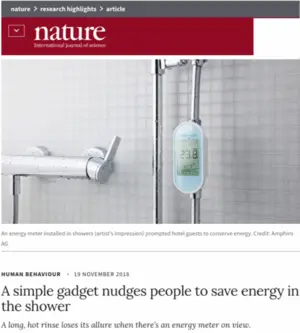
Digitization meets behavioural economics
Digitization makes comprehensive behaviour and consumption data available: modern vehicles, fitness wristbands, mobile phones, digital assistants, electricity meters and intelligent everyday objects are collecting more and more user data - in real time and at ever lower costs. The Chair of Information Systems, esp. Energy Efficient Systems, researches how this data can be used in everyday life to support decisions and promote desired behaviours - and thereby links the scalability of digitization with the methods of behavioural economics. An example of our work: field studies on the effect of real-time feedback on water and energy consumption in private households.
In cooperation with leading universities (ETH Zurich, National University of Singapore, University of Bonn) and international organizations (Public Utility Board Singapore, Schweizer Mobiliar Versicherung, Amphiro, PWN, Hansa) we examine the effect of feedback interventions in combination with goals, social Norms, monetary incentives and depending on time delays (live vs. outcome feedback).
The results: Randomized controlled field studies with over 3,000 installations show energy savings of an average of 450 kWh per year and household and thus around five times as large effects as conventional feedback applications based on smart meter data. Our work on digital behavioural interventions has received numerous awards (e.g. as a research highlight by Nature http://www.natureasia.com/en/research/highlight/12778) and serves as a central decision-making basis for politics (e.g. the impact assessment for the introduction of smart metering in Switzerland) and led to the founding of successful spin-off companies (Amphiro AG, https://www.amphiro.com/, BEN Energy AG, https://www.ben-energy.com/).
Publications
The research results have appeared in the leading specialist journals in the field of information systems (e.g. Management Science and MIS Quarterly) and energy (e.g. Nature Energy rdcu.be/bbKNx and Energy Policy) and have already been cited several thousand times /eesys#cesearch/publications/
Applications in practice
We look forward to the transfer into practice: Over 50,000 of our intelligent consumption displays are already in use, and Singapore is carrying out a pilot project in 10,000 households with the aim of a complete rollout. The CO2 savings already amount to over 25,000 tons.
Media (selection)
Deutschlandfunk: Real-time information has an energy-saving effect https://www.deutschlandfunk.de/energieverbrauch-beim-duschen-echtzeitinformationen-haben.676.de.html?dram:article_id=433717
Scientific American: Smart Meters Speed Showers https://www.scientificamerican.com/podcast/episode/smart-meters-speed-showers/
Spiegel Online: How we could save more energy when showering http://www.spiegel.de/wissenschaft/technik/energie-sparen-wie-wir-alle-beim-duschen-sparen-koennen-a-1239593.html
